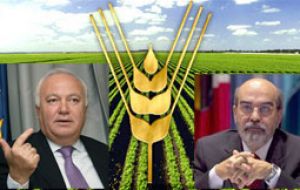MercoPress. South Atlantic News Agency
Brazil and Spain, leading candidates for next head of FAO
 Miguel Angel Moratinos and former Brazilian Food security minister Jose Graziano da Silva
Miguel Angel Moratinos and former Brazilian Food security minister Jose Graziano da Silva Brazilian and Spanish candidates are leading the field for the Sunday June 26 upcoming election for the next head of the Food and Agriculture Organization in Rome, the UN agency leading the struggle against global hunger.
Former Spanish foreign minister Miguel Angel Moratinos and former Brazilian food security minister Jose Graziano da Silva are two of six candidates for Sunday's vote, with the others coming from Austria, Indonesia, Iran and Iraq.
“The tradition is for the agency to go to a developing country and Brazil is not going to miss the chance to take advantage of this,” a source informed about the inner workings of the FAO revealed on condition of anonymity.
“Especially if Europe is going to take over the IMF” the source added, referring to French Finance Minister Christine Lagarde's emergence as the favorite to lead the Washington-based IMF. This week US Treasury Secretary Timothy Geithner in an official release said Ms Lagarde is an “exceptionally talented” candidate to lead the IMF.
The election of the new head of the IMF has stirred anger in top emerging economies about being left out of international decision-making.
Each of the FAO's 191 member states gets one vote in the election -- unlike other United Nations agencies where the biggest contributors get more of a say.
Senegal's Jacques Diouf, the head of FAO for 17 years, is stepping down at the end of the year at a time of rising food prices, persistently high levels of global hunger and growing concern over the effects of climate change.
Farming ministers from the world's G20 leading economies agreed this week in Paris on action to tame market speculation blamed for food price spikes.
Ministers said they would create a rapid response mechanism to respond to food price crises and an international agricultural market information system to remedy a chronic lack of data seen as a major source for volatility.
The ministers also decided to increase agricultural production by 70% by 2050 -- when the world population will be over nine billion people. Another challenge for the future head of the FAO is to complete an overhaul of the organization that has been seen as too centralized and inefficient.
“FAO must be strong and effective,” Graziano da Silva said ahead of Sunday's vote. The Brazilian hopeful is attributed to be the brains and organization behind the successful “Borsa Familia” program that helped feed millions in his country.
Mexico's ambassador to the FAO, Jorge Chen, who is supporting the Spanish candidate over the Brazilian, said that “right now FAO needs to become a political instrument and Moratinos has the right profile for that.”
But there is still a possibility for a compromise candidate to come forward like Europe's former agriculture commissioner Franz Fischler of Austria or Indroyono Soesilo, a veteran natural resources scientist from Indonesia.
The outsiders are Iran's Saeid Noori Naeini and Iraq's Abdul Latif Rashid.
Noori Naeini, Iran's former envoy to the FAO is seen as one of the most experienced candidates but his nationality is believed to count against him.
Faced with these giant challenges, FAO budget of around one billion dollars a year is relatively minor. “That makes about a dollar a year for every person who suffers from hunger,” an expert said.
The official release states that on Sunday 26 June 2011 the FAO Conference will elect a new Director-General. The term of the new Director-General will start on 1 January 2012 and run through 31 July 2015.
The six candidates nominated by their governments, listed in alphabetical order by country, are: Franz Fischler (Austria); José Graziano da Silva (Brazil); Indroyono Soesilo (Indonesia); Mohammad Saeid Noori Naeini (Iran, Islamic Republic of); Abdul Latif Rashid (Iraq) and Miguel Ángel Moratinos Cuyaubé (Spain).




Top Comments
Disclaimer & comment rules-

-

-

Read all commentsThat what we like to see, cooperation between friends,
Jun 24th, 2011 - 12:14 pm 0Sadly it don’t say much of their former colony [oopps sorry illegitimate of spring ]
But then again, when Argentina grows up a bit,
Others might listen, instead of ignoring them,
To the future then??
Briton, grew up.
Jun 24th, 2011 - 08:42 pm 0what does this article has to do with your argentina phobia?
It seems you envy them.
What does this have to do with YOUR anti-British,
Jun 24th, 2011 - 08:58 pm 0If you like them go back and live with them,
Oh i forgot it’s easier to speak from a safe distance
And pretend you care,
Commenting for this story is now closed.
If you have a Facebook account, become a fan and comment on our Facebook Page!